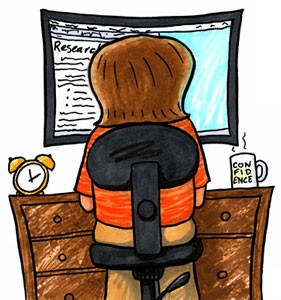An article about university bureaucracy by Elaine Glaser in the Times Higher contained this thought provoking paragraph:
In The Utopia of Rules, Graeber offers a convincing account of bureaucracy’s perverse attractions. It offers a chimera of absolute transparency, consistency and fairness. It is like a game with perfect rules – and which is also not at all fun. In this sense, Graeber argues, at the heart of bureaucracy is a fear of play, of creativity. Unsurprisingly, numerous studies illustrate how creativity is inhibited by the restriction of autonomy, the hallmark of bureaucracy. The fear of freedom may be an understandable human quality, therefore, but it’s lamentable that it’s becoming so firmly enshrined in our work culture.
(Glaser, Bureaucracy: Why won’t academics break their paper chains, THE May 21, 2015)
I have been thinking a lot about work, creativity, fun, freedom, and autonomy. The perverse attraction of bureaucracy, the tension between work and play, and the restriction of autonomy is not limited to those in positions of power. It is enshrined in our work cultures in ways that produce the sort of self-discipline that Foucault and others wrote so eloquently about.
Making time to write
 One of the core principles of the Academic Writing Studio is making writing a priority. In the planning classes, available to Foundations and full members, I suggest scheduling time for it before anything else (with the exception of things like teaching, the scheduling of which you do not control). If this sounds obvious to you and is something you already do, congratulations.
One of the core principles of the Academic Writing Studio is making writing a priority. In the planning classes, available to Foundations and full members, I suggest scheduling time for it before anything else (with the exception of things like teaching, the scheduling of which you do not control). If this sounds obvious to you and is something you already do, congratulations.
In my experience, many academics find it very difficult. It feels selfish. Exploring this difficulty with individual clients has revealed that writing also feels like it’s not work. Intellectually everyone knows that it is, and that it is the work most valued in the processes by which you are evaluated. When you try to make it a priority you notice that, in practice, it is not treated that way.
A Meeting With Your Writing addresses this difficulty by making and protecting time for writing in the face of other demands. Calling it a meeting and having a conference call at a specific time, enables you to refer to your writing time in terms that are undeniably work:
I am unavailable at that time. I have a meeting.
I am unavailable at that time. I have a conference call.
And yet, participants still feel the pull of those other demands.
Is it really okay to write when I have this stack of exams to grade?
Is it really okay to write when I need to prepare that lecture/compile that syllabus/…?
Is it really okay to prioritize writing over that committee meeting?
How you write
The tension between work and creativity/play often becomes obvious in Establishing a Practice, also available to all members. The focus is on what you do during your writing time. Participants are often surprised at elements of their ideal writing practice. Many report feeling anxious about writing, an anxiety that is not only about the quality of the product. Many people experience anxiety about how they write and whether they are doing it right.
In A Meeting With Your Writing, I encourage participants to work on the project that feels most compelling today; the project you most want to work on (for whatever reason, which is not always the one that would be most fun). And yet I know many resist.
We seem to hold deeply ingrained beliefs that work involves coercion and unpleasantness. To freely choose, and possibly enjoy, something seems to make it not-work.
Hence, “bureaucracy’s perverse attractions”.
Things to think about
How does this tension between work and creativity/play arise for you?
Does “fear of freedom” resonate with you in any way (even if it is uncomfortable to admit)?
What small thing could you do to address those tensions and fears in your own practice?
I welcome thoughts in the comments. Please be respectful of the fact that your experience is not universal. You are also welcome to share this post as a starting point for a more private discussion in another forum. Or, use the questions as journal prompts.
Edited August 1, 2016.









Leave a Reply